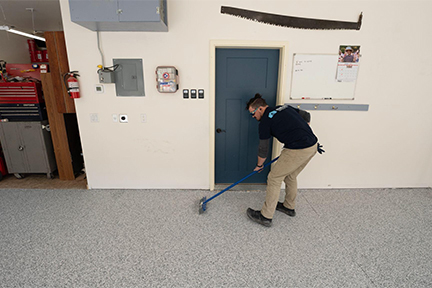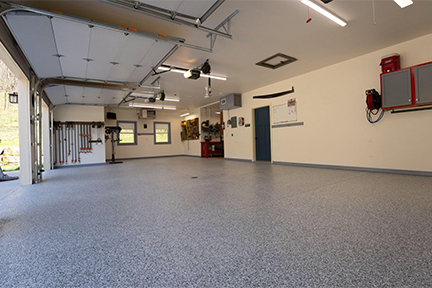
When it comes to choosing the right garage floor coating, homeowners often find themselves torn between polyurea and epoxy options. Both coatings have their unique advantages and disadvantages.
The Basics of the Coatings You Should Know
Epoxy Coatings
Epoxy coatings are made from a combination of resin and hardener, which creates a durable surface when applied to concrete. They have been a popular choice for garage floors for a long time now.
Pros of Epoxy:
- Cost-effective: Epoxy coatings are generally less expensive than polyurea, making them an attractive option for budget-conscious homeowners.
- Good adhesion: They bond well to concrete surfaces, providing a solid layer of protection against spills and stains.
- Variety of finishes: Epoxy comes in various colors and finishes, allowing homeowners to customize their garage’s appearance.
Cons of Epoxy:
- Long cure time: Epoxy coatings can take several days to cure fully, which means longer downtime for the garage.
- Temperature sensitivity: They can be sensitive to temperature changes during application, which may affect the final finish.
- Less flexibility: Epoxy can become brittle over time, leading to cracks and peeling in areas with heavy foot or vehicle traffic.
Polyurea Coatings
Polyurea, on the other hand, is a newer technology. It is a type of elastomer. Companies like https://renuityhome.com/ specialize in high-quality garage floor coating provision from this material. As a top remodeling contractor with a proven track record, it ensures that homeowners receive a supreme level of service, with long-lasting results that outperform traditional coatings. Their expertise guarantees that the garage floor coating is applied correctly and efficiently.
 Pros of Polyurea:
Pros of Polyurea:
- Rapid cure time: Elastomeric coatings cure within hours, allowing homeowners to use their garage almost immediately after application.
- Superior durability: They are significantly more resistant to impacts, abrasions, and chemicals compared to epoxy.
- Flexibility: Polyurea maintains its flexibility, which reduces the risk of cracking under stress or temperature changes.
- UV stability: Unlike epoxy, polyurea does not yellow or degrade when exposed to sunlight, maintaining its appearance over time.
Cons of Polyurea:
- Higher cost: Elastomeric coatings typically come at a higher price point than epoxy, which can deter some homeowners.
- Professional installation required: Due to the complexity of the application process, it is often recommended that elastomeric coatings be installed by professionals.
Why Polyurea is the Future of Garage Floor Coatings?
With advancements in flooring technology, polyurea has proven to be the more innovative and forward-thinking choice for garage floors. Its application process, durability, and long-term value make it stand out as a superior option for homeowners looking for modern solutions.
One of the key reasons elastomer is gaining popularity is due to its environmental benefits. Unlike traditional coatings, polyurea has a lower volatile organic compound (VOC) emission, making it a more environmentally friendly choice for homes. This reduced environmental impact is especially important for homeowners who prioritize sustainability and eco-conscious renovations.
In addition, polyurea can be customized with different textures and finishes, providing homeowners with a variety of design options that suit their personal style. Whether it's a high-gloss finish for a modern look or a textured surface for improved safety, polyurea offers flexibility in design that other coatings simply can't match. This makes it an ideal choice for homeowners looking to combine functionality with aesthetics.
 Final Thoughts
Final Thoughts
While both epoxy and polyurea coatings have their merits, the first stands out for its rapid curing time, flexibility, and long-lasting durability. Homeowners looking for a high-quality garage floor coating should consider elastomeric as their top option. With professional installation and proper care, polyurea coatings offer the best solution for protecting your garage floor from daily wear and tear.
